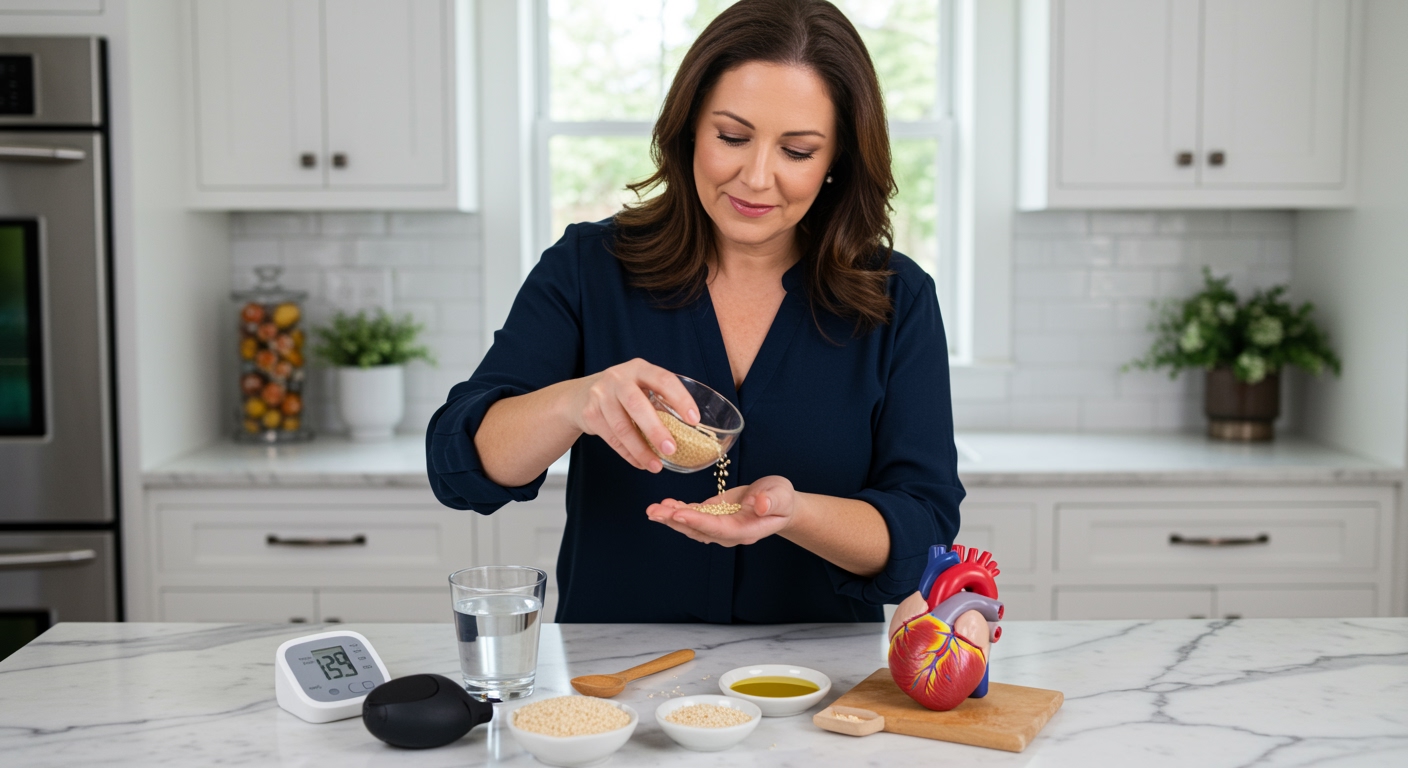✪ Key Takeaway: Sesame seeds may help lower blood pressure through lignans and magnesium that relax blood vessels naturally.
Introduction
Your grandmother probably sprinkled sesame seeds on bread without knowing she was adding a potential blood pressure fighter.
You might be wondering about sesame seeds because your doctor mentioned lifestyle changes for your blood pressure, or maybe you heard someone talking about natural remedies that actually work.
Hi, I am Abdur, your nutrition coach and today I am going to explain how sesame seeds might help lower your blood pressure and what the science really says about this tiny powerhouse.
What Makes Sesame Seeds Special for Blood Pressure?
Sesame seeds contain lignans, which are plant compounds that act like gentle blood vessel relaxers in your body.
The main lignan in sesame seeds is called sesamin, and it works by helping your blood vessels stay flexible and open.
When your blood vessels relax, your heart does not have to work as hard to pump blood through them.
This natural mechanism can lead to lower blood pressure readings over time.
Sesame seeds also pack impressive amounts of magnesium, a mineral that directly supports healthy blood pressure levels.
Your body uses magnesium to help regulate the electrical signals that control your heartbeat and blood vessel function.
✪ Fact: Just one tablespoon of sesame seeds provides about 32 milligrams of magnesium.
Does Research Support These Claims?
Several studies have tested sesame seeds specifically for blood pressure benefits, and the results look promising.
One clinical trial found that people who ate sesame seeds daily for 45 days experienced significant drops in both systolic and diastolic blood pressure.
The participants consumed about 2.5 grams of sesame powder twice daily, which equals roughly one tablespoon of whole sesame seeds per day.
Another study showed that sesame oil, which contains concentrated amounts of the same beneficial compounds, helped reduce blood pressure in people with hypertension.
The research suggests that regular consumption over several weeks produces the best results, not just eating sesame seeds once or twice.
Scientists believe the antioxidant properties of sesame seeds also play a role by protecting blood vessels from damage that can lead to stiffness and high pressure.
✪ Pro Tip: Choose hulled sesame seeds for better absorption of beneficial compounds.
How Much Should You Eat for Benefits?
The effective dose from research studies suggests eating about one tablespoon of sesame seeds daily.
This amount provides approximately 52 calories and fits easily into most eating plans without causing weight gain.
You can sprinkle them on salads, blend them into smoothies, or eat them as a healthy snack between meals.
Some people prefer tahini, which is sesame seed butter, but remember that tahini is more calorie-dense than whole seeds.
The timing of consumption does not seem to matter much, but spreading your intake throughout the day might help maintain steady levels of beneficial compounds in your bloodstream.
Start with smaller amounts if you have never eaten sesame seeds regularly, as some people experience mild digestive upset when they suddenly increase fiber intake.
✪ Note: Toast sesame seeds lightly to enhance their nutty flavor and make them more appealing.
Are There Any Risks or Side Effects?
Sesame seeds are generally safe for most people, but you should know about a few potential concerns.
Sesame allergies are becoming more common and can cause serious reactions in sensitive individuals.
If you have never eaten sesame seeds before, start with a very small amount to test your tolerance.
People taking blood pressure medications should talk to their doctor before adding large amounts of sesame seeds to their diet, as the combination might lower blood pressure too much.
Sesame seeds are high in oxalates, compounds that can contribute to kidney stone formation in susceptible people.
The calorie content adds up quickly if you eat large portions, so stick to the recommended one tablespoon daily serving size.
✪ Pro Tip: Monitor your blood pressure regularly when adding any new food for health benefits.
The Bottom Line
Sesame seeds show real promise for helping lower blood pressure naturally through their unique combination of lignans, magnesium, and antioxidants.
Small seeds can create big changes when you eat them consistently over time, but they work best as part of an overall healthy lifestyle that includes regular exercise and a balanced diet.
What questions do you have about using sesame seeds for blood pressure management, or have you tried this natural approach yourself? Share your thoughts and experiences in the comments below.
References
At NutritionCrown, we use quality and credible sources to ensure our content is accurate and trustworthy. Below are the sources referenced in creating this article:
- PubMed: Effects of sesame consumption on cardiovascular risk factors
- PMC: Sesame ingestion affects sex hormones, antioxidant status, and blood lipids in postmenopausal women
- Frontiers in Endocrinology: Sesame Seeds and Sesame Oil: A Review of Their Nutritional and Therapeutic Properties
- PMC: Nutritional and health benefits of sesame seeds





